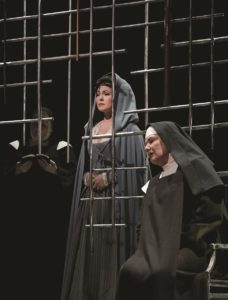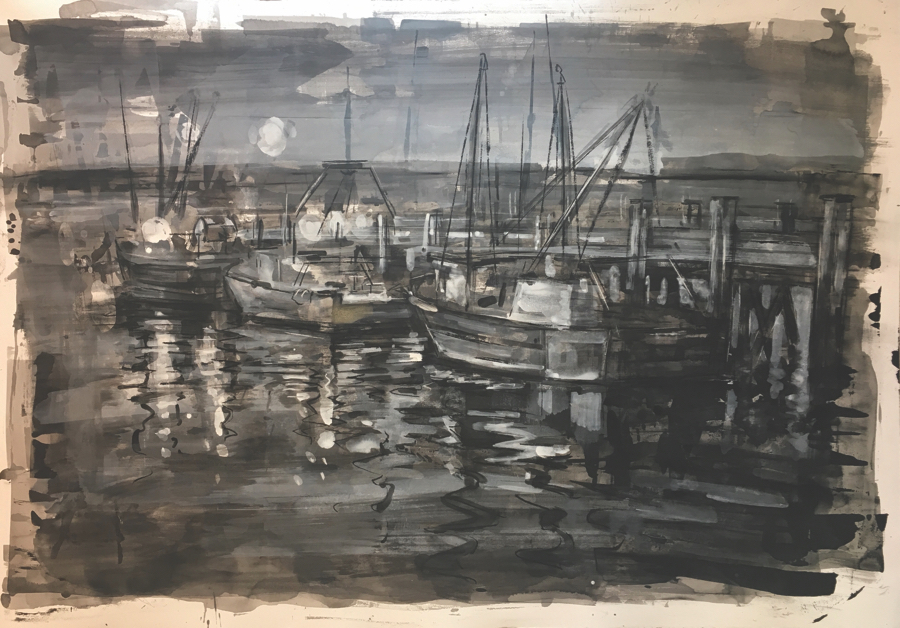The Metropolitan Opera will be streaming Les Dialogues des Carmélites by Francis Poulenc for free next Friday, Sept. 20, starting at 7:30 p.m. You won’t want to miss it.
The opera is based on the true story of 16 Carmelite nuns who were sent to the guillotine on July 17, 1794, during the French Reign of Terror. It juxtaposes fear and anxiety with grace and profound faith.
I grew up Unitarian and have no personal experience with mystical states of enlightenment. But the truth is, I cry every time I watch the end of this opera. I am always moved by the serene and determined state with which the nuns walk to the scaffold singing the hymn Salve Regina.

Here’s the history: In the 1790s, just north of Paris in Compiègne, an order of Carmelite nuns lived a quiet life in a secluded cloister. That is, until the revolutionary council targeted them for praying, wearing habits, and adhering to the old order. They were forced to leave the cloister and live among the people. In defiance, they continued to meet and pray together.
In 1794 they were found guilty of “gathering illegally, spreading fanatical writings opposed to freedom, as a body of rebels, openly seditious, who desire to see the people of France once more in the chains of tyrants, to see liberty drowned in torrents of blood, which their treacherous plots have brought about in the name of God.”
They were imprisoned, and on the day of execution, led through the city in a death cart. All the while, they sang hymns, the last one being Psalm 117, Laudate Dominum. By all accounts, the crowd was unusually silent during the 16 beheadings.
Eleven days later, Maximilien Robespierre himself was executed. The martyrdom of the 16 nuns seems to have been the catalyst. The French people were coming to their senses about their own barbarity and loss of reason.
Flash forward to 1931. Gertrude von le Fort, a German baroness, wrote an epistolary novella based on the memoir of one nun who survived the events of 1794. Le Fort added a fictionalized main character, Blanche de la Force, whose first name simultaneously refers to purity and pallid fear, and whose last name refers to strength. Blanche is a proxy for le Fort herself, who, in the 1930s, was becoming increasingly alarmed by the anti-religious fascist fervor in her own country.
It was on this novella that Poulenc based his 1956 opera. In it, Blanche’s character, gripped by anxiety, finds peace in the cloister. Soon after her arrival, however, the mother superior dies a difficult death. Blanche struggles to parse the event: though her faith teaches her to accept the will of God, she cannot accept how the mother superior suffered.
Blanche becomes friends with a sister novice, Constance, who is open and content in her faith. These two young nuns carry the narrative. It is all about the unhappy condition of living in the real world, in contrast with the divine and peaceful state achieved by prayer.
Francis Poulenc himself had a complicated relationship with the sacred. Born to a religious family, he was discouraged from pursuing music. Driven by his talent, however, he was able to make an early mark with the ballet Les Biches (“The Does” or “The Darlings”), which has no plot or story, but was a tremendous success in 1924.
Poulenc became part of “Les Six,” a group of composers who advocated a new direction for modern classical music. They rejected notions of romanticism, favoring a simpler, sparer sound, and composing more light-hearted works.
Poulenc also struggled with his own fluid sexuality. He was jokingly referred to as having “one eye of the Jesuit and one eye of the gutter.” In 1936, Pierre-Octave Ferroud, a good friend and fellow composer, died in a car crash, sparking a religious seriousness in Poulenc that lasted until the end of his life.
This Met production of Dialogues, from May 11, 2019, is spare, with hardly any scenery, which mirrors the simplicity of the music. It also draws the listener’s attention to the characters’ inner states.
Isabel Leonard, with her clear voice, believably portrays Blanche’s struggle with fear and faith. Karita Mattila gives a stunning portrayal of the mother superior, whose job is to set an example of pure faith, but who, in a human way, fails in the end.
Be prepared for the final scene with a box of tissues.
The full synopsis is available at the Metropolitan Opera website, metopera.org.
Désirée Elsevier has been a violist in the Metropolitan Opera Orchestra since 1987.



